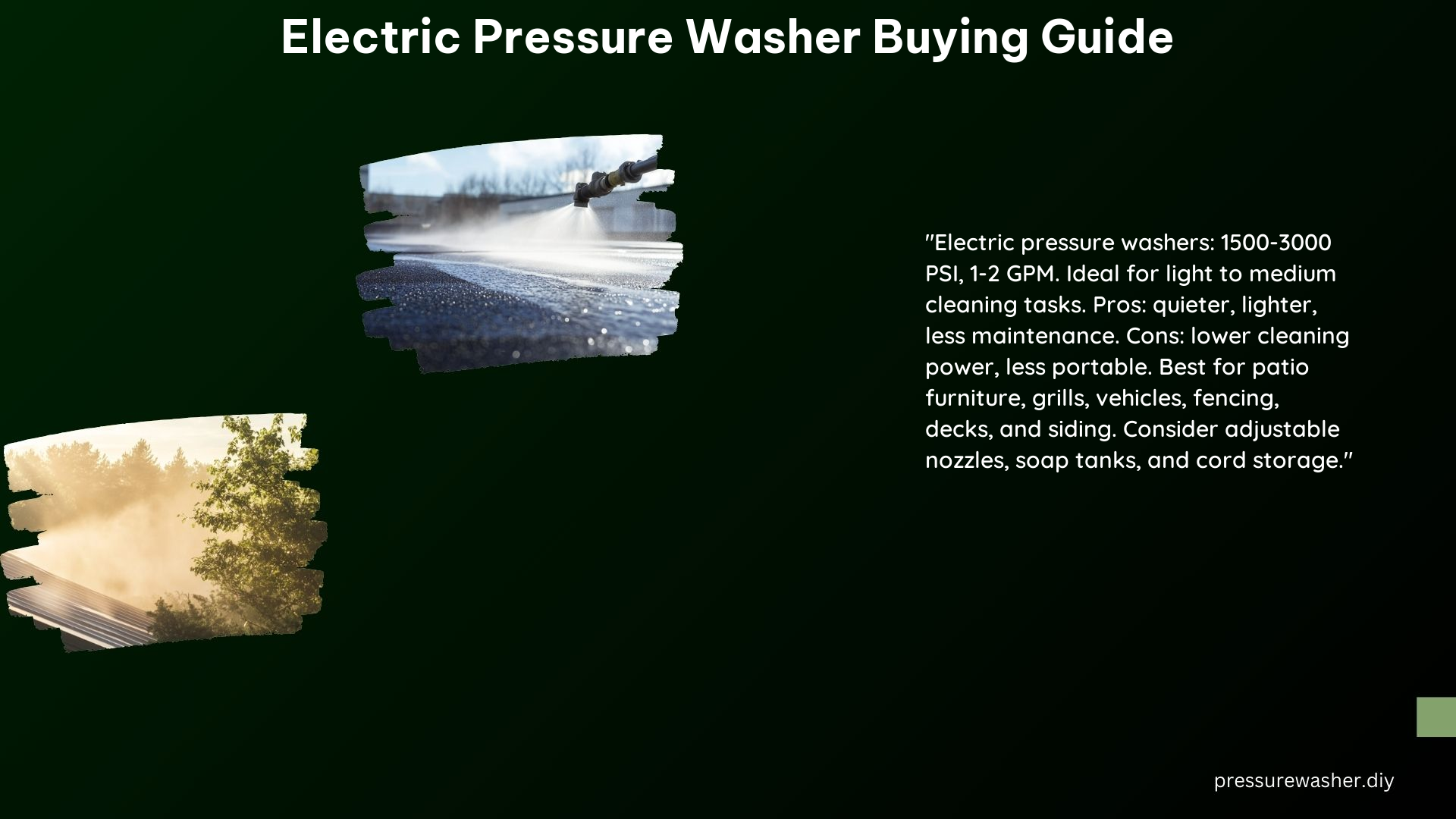Electric pressure washers have become increasingly popular in recent years, offering a convenient and eco-friendly alternative to traditional gas-powered models. Whether you’re looking to clean your car, patio, or siding, an electric pressure washer can be a valuable addition to your home maintenance arsenal. This comprehensive buying guide will help you navigate the key features, technical specifications, and essential considerations to ensure you select the perfect electric pressure washer for your needs.
Key Benefits of Electric Pressure Washers Compared to Gas Models
-
Maintenance-Free Operation: Electric pressure washers require minimal maintenance, as they do not need oil changes or gas refills. This makes them more convenient to use and maintain, saving you time and effort.
-
Quieter Performance: With noise levels typically ranging from 80 to 90 decibels, electric pressure washers operate much more quietly than their gas-powered counterparts, which can reach up to 100 decibels. This makes them suitable for use in residential areas without disturbing your neighbors.
-
Cost-Effective: Electric pressure washers are generally less expensive to purchase and operate than gas models. The absence of fuel costs and reduced maintenance requirements contribute to their overall cost-effectiveness.
-
Lightweight and Portable: Weighing between 20 to 40 pounds, electric pressure washers are significantly lighter than gas models, which can weigh up to 75 pounds. This makes them easier to maneuver, transport, and store.
-
Environmentally Friendly: By eliminating the need for gasoline and oil, electric pressure washers produce no direct emissions, making them a more eco-friendly choice for your home and the environment.
Choosing the Right Electric Pressure Washer for Your Needs

When selecting an electric pressure washer, consider the following key factors:
1. PSI (Pounds per Square Inch)
The PSI rating determines the cleaning power of the pressure washer. For general cleaning tasks around the home, a PSI range of 2,000 to 3,000 is typically sufficient. Higher PSI ratings, such as 3,000 to 4,000 PSI, are better suited for more demanding applications like removing stubborn grime or cleaning large surfaces.
2. GPM (Gallons per Minute)
The GPM rating indicates the water flow rate of the pressure washer. For most residential tasks, a GPM range of 1 to 3 is adequate. Higher GPM ratings, typically 3 to 4 GPM, can provide faster cleaning but may consume more water.
3. Nozzle Type
Look for electric pressure washers with adjustable or replaceable nozzles. Adjustable nozzles offer more versatility, allowing you to switch between different spray patterns (e.g., fan, pencil, or soap) to suit various cleaning tasks. Replaceable nozzles provide even more precise control over the spray angle and intensity.
4. Cord Length and Portability
Consider the length of the power cord, which typically ranges from 25 to 50 feet, to ensure you have enough reach for your cleaning needs. Additionally, pay attention to the weight of the unit, as lighter models (20 to 40 pounds) will be easier to maneuver and transport.
5. Additional Features
Look for electric pressure washers with additional features that can enhance your cleaning experience, such as built-in soap tanks, onboard tool storage, and wheels for improved mobility.
Essential Features to Consider
-
Safety Features: Ensure the pressure washer has safety features like a safety lockout switch and a trigger lock to prevent accidental starts, protecting both you and your equipment.
-
Noise Level: If noise is a concern, prioritize electric pressure washers with lower decibel ratings, typically in the 80 to 90 decibel range, for quieter operation.
-
Hose Length and Material: A longer, more durable hose (typically 20 to 35 feet) will provide greater flexibility and reach during your cleaning tasks.
-
Warranty and Support: Check the manufacturer’s warranty and customer support options in case you encounter any issues with your electric pressure washer.
-
Price and Value: Balance the cost of the pressure washer with its features, performance, and overall value to ensure you get the best bang for your buck.
Technical Specifications
When comparing electric pressure washers, pay attention to the following technical specifications:
- PSI: 2,000 to 3,000 PSI for general cleaning tasks, 3,000 to 4,000 PSI for more demanding applications
- GPM: 1 to 3 GPM for most residential tasks, 3 to 4 GPM for faster cleaning
- Cord Length: 25 to 50 feet for greater mobility and reach
- Weight: 20 to 40 pounds for easier portability
- Noise Level: 80 to 90 decibels for quieter operation
Reference Links
- The Home Depot: Pressure Washer Buying Guide
- Reddit: Is buying a pressure washer worth it for general around the home use?
- Consumer Reports: Best Pressure Washer Buying Guide
- Lowe’s: Pressure Washer Buying Guide
- Pressure Washers Direct: Pressure Washer Buyer’s Guide – How to Pick the Perfect Pressure Washer
By considering the key benefits, essential features, and technical specifications outlined in this comprehensive Electric Pressure Washer Buying Guide, you’ll be well-equipped to make an informed decision and select the perfect electric pressure washer for your home cleaning needs.
